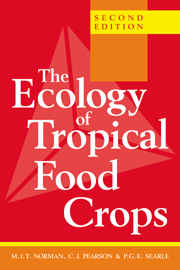Preface
Published online by Cambridge University Press: 05 June 2012
Summary
The first edition of The Ecology of Tropical Food Crops was published at the end of a grand era of research on the physiology, ecology, agronomy, soil science and micrometeorology which underlie crop production. This research was driven by international concern about the need to increase food production to meet demands from increasing population, particularly in tropical countries, and by developments in scientific methodology and funding. As we began the preface of that edition: ‘Noone in the 1980s needs to be reminded of the necessity to increase food production in tropical countries…the number of people in the tropics … will rise by AD 2000 to over 3 billion.’
In the decade since, some things have changed markedly and others have remained unchanged. Agricultural science has changed: research in the disciplines which immediately underpin crop production has waned while more attention has been given to two complementary areas. More attention is now directed to farming systems and particularly to environmental research and resource management, and to more basic fields such as molecular biology. There is thus a broader attack on problems and opportunities of tropical food crops than ten years ago.
While predictions made in 1984 about population growth proved true, few people foresaw the consequences of that growth, the rural poverty which would persist and deepen in parts of the tropics, and the widespread degradation of soil and water which would result from poor management of tropical cropping systems.
- Type
- Chapter
- Information
- The Ecology of Tropical Food Crops , pp. ix - xPublisher: Cambridge University PressPrint publication year: 1995



